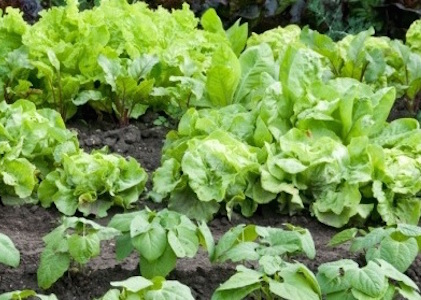
A Kitchen Garden – Getting Started, part 2
By Pamela Page
Whether you have a week or a weekend, an acre or a window box, growing your own food is easy. All it takes is sunlight, warm days, water and some basic knowledge:
1) Fruits and vegetables like nutrient rich soil, dirt with microbes and minerals. Give a plant great soil, and the plant will give you great tasting produce full of nutritional value. Fruits and vegetables grown in poor soil don’t taste as good and aren’t as good for you.
But be careful! Over-fertilizing causes plants to produce lots of leaves and not a lot of fruit. And it makes things taste bland. Follow the directions on store-bought fertilizer. Better still – make your own fertilizer aka compost. I’ll soon show you how in another post.
Plants also need soil that has good structure – not too sandy, clayey, or compacted. So never step into your beds. The soil should be fluffy – like your favorite pillow. Never work or plant into wet soil.
2) Plants, like kids, need room to grow. I make a planting plan. And I stick to it – even if in the beginning, there’s a lot of blank space on my canvas.
So whether I’m sowing seeds or setting out seedlings, I respect a plant’s spacing requirements. You can find this information on the plant’s label or on the back of the seed packet.
3) If you have deer, raccoons, squirrels, moles, groundhogs, rabbits or birds, it’s wise to have a strong defense. And the strongest defense is da fence.
4) Stay safe. Ever step on a nail? Hardly a pleasant experience. Stepping on a rake, a cultivator or a compost fork is no fun either. Never leave tools on the ground
We absorb vitamin D when we work in the sunlight, and this in turn promotes the production of calcium in the body – a really good gardening perk if you’re a small-boned blue-eyed woman like I am. But too much sun leads to skin cancer so I always wear a hat and sunscreen. I always stretch before I do strenuous work.
In July, wasps make nests in the ground or attach their nests to my garden fence. I inspect the fencing throughout the summer and keep a can of wasp killer in my garden tote in case I’ve missed a nest. Bees also nest in the ground. I never garden barefoot. As for Lyme disease, if I’m doing anything other than harvesting, I always wear long pants, and I carefully check myself for ticks after a day in the garden.
5) If you’ve never gardened before, start small. I realize it’s tempting to plow up the front lawn, fill in the swimming pool, convert the tennis court and install planters on every inch of flat roof, but trust me, in the beginning, a 6 x 6 foot bed, or a few large containers, will do just fine.